Angels play a prominent role throughout the Bible, primarily as God’s messengers. The Greek word angelos is embedded in evangelos, from which we get “evangelist.”
The Western Christian calendar celebrates the Festival of St. Michael and All Angels on September 29. This day devoted to God’s messengers comes from the date of the dedication of the Basilica of St. Michael on the Via Salaria outside Rome. It became an important date in the Western calendar by the 9th century. The fall term in British schools and courts of law is called the Michaelmas term.
Having a day devoted to God’s creatures who serve him in Heaven is a good reminder that we are not God’s only rational beings. The difference between humans and angels is that we are corporeal, the angels are spiritual. We have bodies, angels do not. By the way, for that reason we do not become angels at death. We are in different orders in creation. We are bodily creatures, not spiritual creatures. Whatever the state of our souls after death, we look for the resurrection of our bodies, even in glorified form like Christ’s risen body.
Since angels are spiritual beings we cannot see them—unless they assume bodily form. That happened in a number of biblical stories: the three strangers who visited Abraham and Sarah at the Oaks of Mamre; the three men who visited Sodom who check out its reputation for wickedness and were given hospitality by Lot; the angel with whom Jacob wrestled through the night at Bethel. Presumably, Mary was able to see Gabriel, who visited her with the astounding announcement that she would bear the Son of God. According to three of the gospels, an angel (or two) announced the resurrection of Jesus to the myrrh-bearing women.
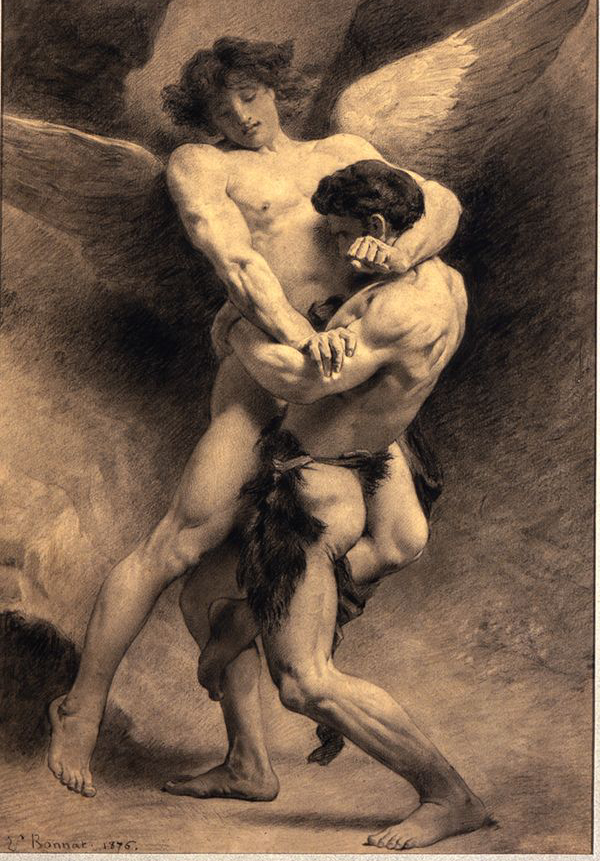
Jacob wrestling with an angel by Leon Bonnat
Michael figures prominently as the warrior who led the heavenly army against Satan in the angelic rebellion in Heaven before the creation of our world. So, there are fallen angels, and there was a role for Satan also in the Bible. Did Satan take the form of a snake in the temptation of Adam and Eve? The Book of Revelation calls Satan “the great dragon,” “that ancient serpent.” Works of art, like the sculpture of St. Michael defeating Satan in the Paris fountain(see the image above this article), show this archangel as a being of great strength dressed in Roman-style breastplate and helmet. But the sculpture by Ad Wouters of St. Michael in the Jesuit Church in Leuven, Belgium shows a young man (with a penis) breaking his sword, as if say “No more warfare.”
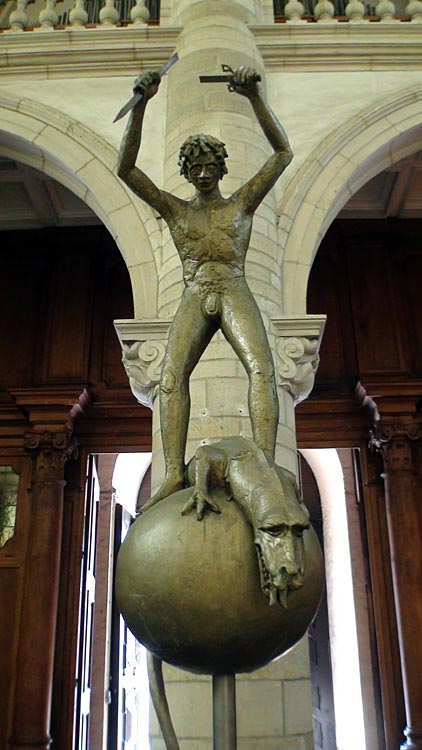
The great English poet, John Milton, included the pre-history of this created world in Paradise Lost. Satan has the best lines. “For to reign is worth ambition, though in Hell. Better to reign in hell than to serve in heaven.” Satan wants freedom from serving God.
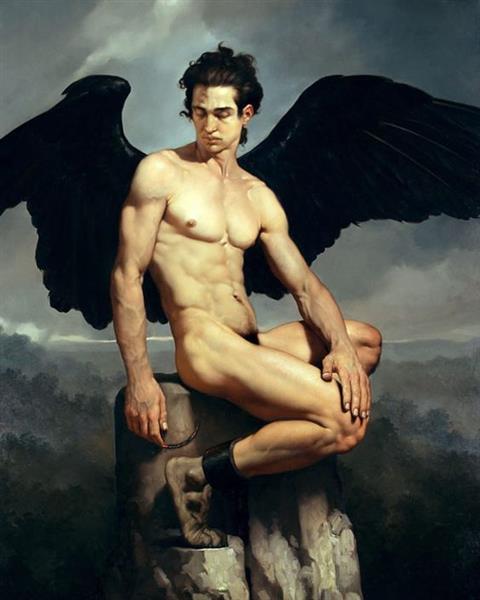
“Lucifer” by Roberto Ferri. The fallen angel ponders his strategy now that he is free of the shackles of serving God.
Satan and his angels are thrown out of heaven and down to Earth, but they have not ceased their rebellion. So spiritual warfare continues. The devil, as Satan is also known, continues to “prowl around like a roaring lion, looking for someone to devour” (1 Peter 5:8—9). The angels (the good ones) are assigned a role of protecting God’s people. There are guardian angels. In Martin Luther’s Small Catechism, the morning prayer upon arising and the evening prayer before retiring include the lines based on Psalm 91, “Let your holy angels have charge of us that the wicked one have no power over us.”
So Christians on this day give thanks to God for the help God’s holy angels give us day by day, even though we don’t see them. Because they are invisible to us, we really don’t know what they look like, or even if they have wings. But artists have exercised great imagination on our behalf to express theological speculation as to how quick the holy angels are to do God’s bidding.
There is one more thing. The angels worship God unceasingly in Heaven and we join the worship of the angels and archangels in offering to God our praise and thanksgiving. Isaiah had a vision of winged heavenly beings flying around the throne of God acclaiming “Holy, holy, holy is the Lord God of sabbaoth (hosts).” Since the third century this thrice-holy hymn (the Sanctus) has been included in the Eucharistic liturgy. This makes the worship of the earthly church a cosmic event. It may take place in this world, but worship also takes us out of this world. Having painted or sculptured angels in our worship space reminds us of the cosmic dimension of our liturgy. It embraces what we can see but also what we can’t see, for we confess that our God has created everything seen and unseen.
Pastor Frank
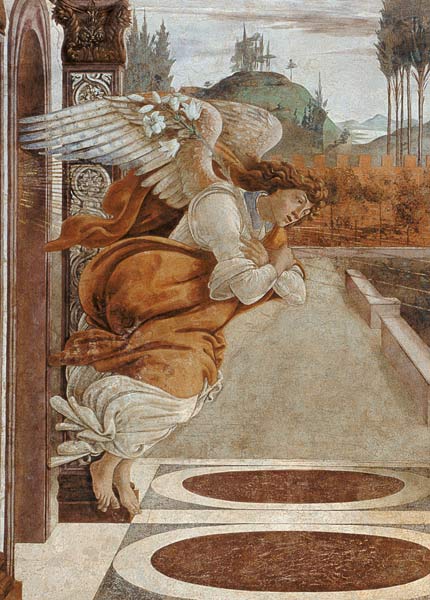
Botticelli, “Angel of the Annunciation”

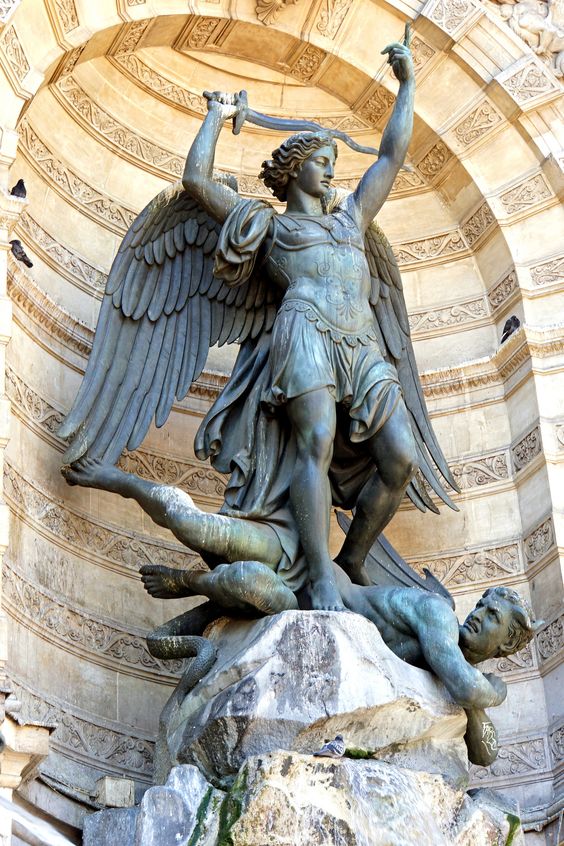
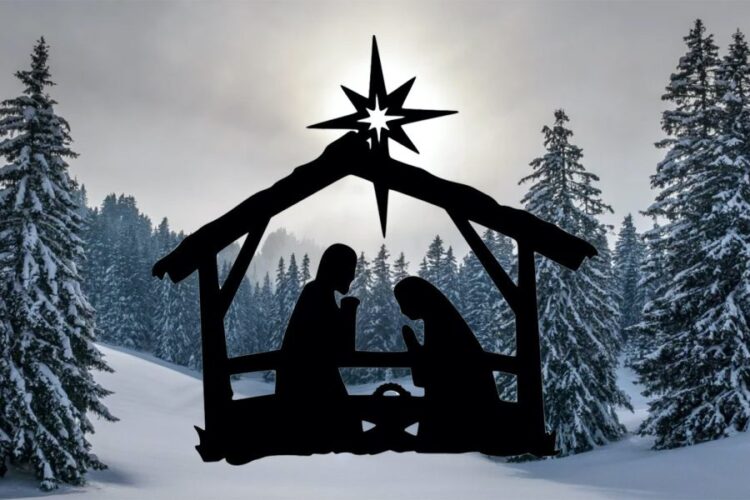
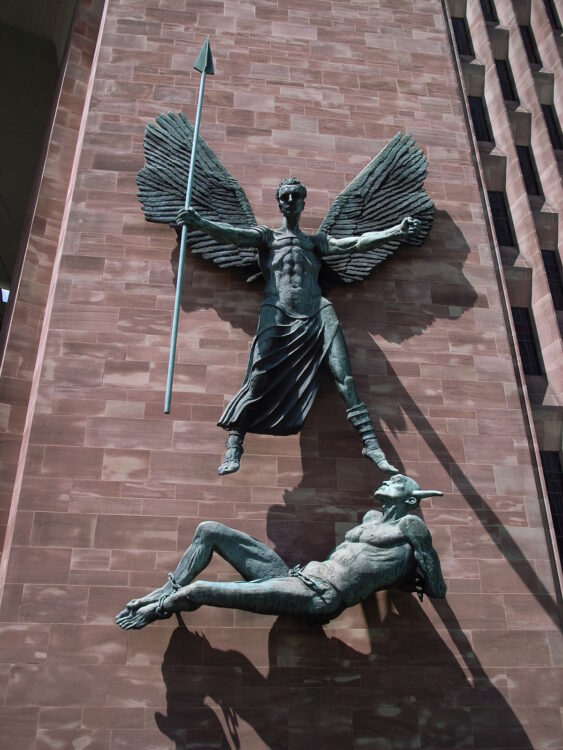
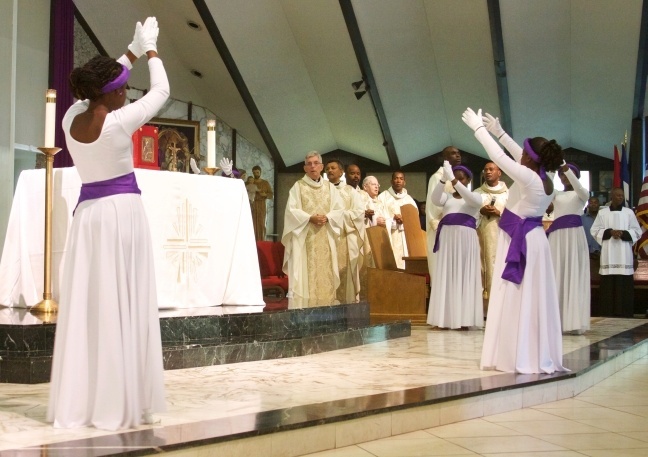

i consider angels a threat to many in mainstream Protestant theology. Sure they’re cute as kids dressed up for a Christmas pageant, but their role as direct messengers from God is a threat to the church’s authority. For this reason I believe Paul told early Christians to disregard any angels over his teachings should they encounter one. I also find the story of Jacob wrestling the angel in his dream powerful as my dreams are often about fighting out what I need to let go of. In a wider sense, I ask the question: who are considered the messengers of God or the Higher Power today? Society is rejecting the traditional authority of ministers, artists and academics to embrace the examples and insights of celebrities, sports heroes and social media influencers. You could say “they’re no angels,” but people have always recognized the human side of those who they’ve put on a pedestal.